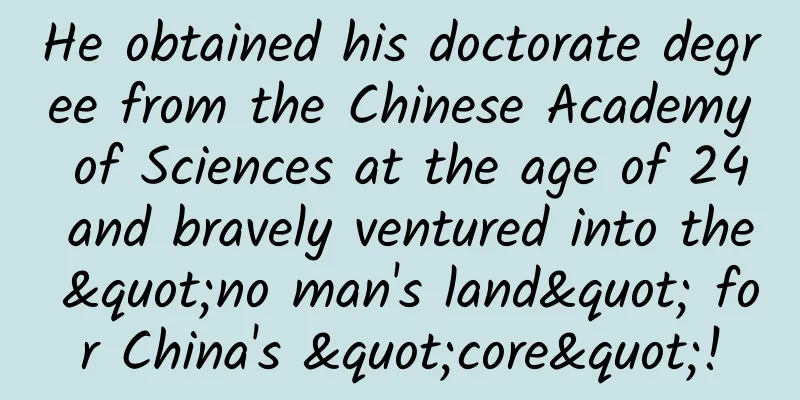He obtained his doctorate degree from the Chinese Academy of Sciences at the age of 24 and bravely ventured into the "no man's land" for China's "core"!

|
At the age of 14, he was admitted to the Junior Class of the University of Science and Technology of China. At the age of 24, he obtained a doctorate degree from the Chinese Academy of Sciences. At the age of 29, he was promoted to researcher. At the age of 32, he was shortlisted for the list of 35 outstanding young innovators under the age of 35 selected by MIT Technology Review magazine worldwide. At the age of 33, he won the China Youth Science and Technology Award and the Chinese Academy of Sciences Young Scientist Award... To outsiders, Chen Yunji, who was born in 1983, has grown up as if he was on the "fast track". However, he believes that there is no shortcut to scientific research. "I am very lucky to have found a mission that I am willing to devote my life to." In February 2018, the world's authoritative academic journal Science published an article titled "China's AI Imperative", commenting on the deep learning processor chip research results of Chen Yunji's team as "groundbreaking progress" and evaluating them as "pioneers" and "recognized leaders" in the field. What has enabled this young scientist, surrounded by halos, to make one breakthrough after another in related fields and attract the attention and recognition of many international academic research organizations? During a program recording, Chen Yunji said that he rarely got first place in the exams when he was in the junior class, and even often ranked last. "At that time, I liked playing games, and games made me think that computers were very interesting from the bottom of my heart." In Chen Yunji's view, chip design and even scientific research are also very complex and intense games in a sense. "However, this game has no strategy and no opponent. What we need to do is to explore methods and surpass ourselves." When he was in his fourth year of university, Chen Yunji wanted to study for a master's degree at the Institute of Computing Technology of the Chinese Academy of Sciences. Hu Weiwu, the leader of the Loongson 1 development team, took a liking to him. Since then, Chen Yunji has been engaged in processor architecture research and development until now. "Without Loongson, I would not be where I am today." At the age of 25, Chen Yunji became the main architect of the 8-core Loongson 3. Unlike Loongson 1 and 2, Loongson 3 has evolved from a single core to a multi-core. "In the past, we prepared one table of food for one table of guests, but now we have to prepare eight tables of food for the guests." Chen Yunji (first from right) takes a photo with his classmates in the Loongson team. Photo provided by the interviewee In order to successfully "serve the dish", Chen Yunji and his colleagues read many papers, but could not find a ready-made solution. After continuous exploration, he proposed a fast and complete storage consistency verification method to ensure the correctness of multi-core processor design. The paper was eventually accepted by HPCA, one of the three flagship conferences in the field of architecture. This is also the first paper in HPCA with a first author from mainland China. Under the guidance of his mentor Hu Weiwu, Chen Yunji set a more ambitious goal: "In research, we must dare to do things that most people dare not try." Since the beginning of the 21st century, artificial intelligence technology has developed rapidly around the world. However, the scale of intelligent algorithms has grown rapidly, while the development of hardware systems has been extremely slow. In order to solve this contradiction, Chen Yunji, who studies chip design, started exchanges and cooperation with colleagues who study artificial intelligence. They envisioned "making something to make computers smarter, with the ultimate goal of making them as smart as humans." In practice, this road is far from being as smooth as imagined. They proposed a series of processor development technologies based on artificial intelligence methods and submitted papers to top architecture conferences many times, but they were rejected in the end. However, these did not make Chen Yunji give up. He believed that as long as he did more in-depth research, no matter how many difficulties he encountered, he could always overcome them. In 2014, Chen Yunji led his team to work with Inria in France to propose the world's first deep learning processor architecture, and won the best paper award at the international conference (ASPLOS). This was not only the first time that a domestic research institution won the best paper award at a top international conference on computer architecture, but also the first time in Asia and the second time outside the United States that a country won the best paper award at the ASPLOS conference. "As a researcher, you may feel lonely when doing scientific research in unknown fields, especially when doing research that no one else has ever done. However, researchers with scientific ideals should deviate from the optimal path in the general sense and have the courage to explore unpopular and unknown fields, because the vast ocean of artificial intelligence is worth devoting all your energy to explore and strive for." Chen Yunji said that scientists need to always explore the unknown of the world with a curious eye. To achieve independent innovation in science and technology, we must have the courage to challenge the "no man's land", and at the same time we must stay focused and move forward toward the goal with the concentration of "ten years as one day" and the patience of "ten years to sharpen a sword". Source: People's Daily Online - Strong Country Forum |
<<: A man's action caused more than 30 cars to burn! Be careful recently
Recommend
Is it better to eat beef or pork? I didn't expect to have been eating the wrong one all along →
For meat lovers, pork and beef are probably indis...
How to create a hit on Douyin?
In July this year, the official TikTok revealed a...
What would the world be like without Android?
A piece of news that Kodak will join hands with a...
Optimization of Toutiao information flow advertising
Toutiao advertising optimization (taking games as...
Miaoshen Talk: The era of cross-platform development has arrived (again)
[[135054]] This article mainly wants to talk abou...
Former senior operator of Xiaomi: After three years at Xiaomi, I summarized the four most important experiences in user operations
User operation is a very important part of the op...
What should I do if the information flow delivery effect is not good? Just need to understand these 4 data!
How to play information flow advertising ? Who sh...
What are the benefits of developing mini programs?
What are the benefits of developing mini programs...
How can I promote more cost-effectively in Baidu SEM?
Now Dongguan Feng Chao editor has found that more...
In-depth analysis of information flow delivery, the key method to rapidly increase ROI
What exactly is advertising, trying to convince y...
Is the loved-and-hated Chinese toon fragrant or smelly?
This article was reviewed by Liu Shaowei, food sa...
Ten years of promotion, two years of entrepreneurship: From unicorn to the altar, all the experiences and gains and losses are here!
From a unicorn to falling from the altar, from cr...
Gartner: Smartphone shipments saw the “worst decline ever” in the first quarter
The global smartphone market suffered its largest...
Rags and sweaters alert! Are humans powerless against moths that eat sweaters?
Leviathan Press: It’s hard to have a favorable op...
Tutorial on new bond projects, can you make money by buying new bonds? How to buy new bonds
Tutorial on new bond projects, can you make money...









